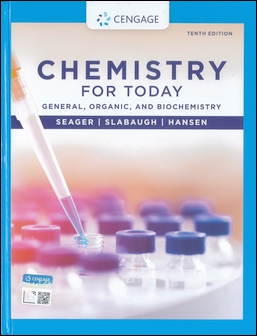書籍分類

Chemistry for Today: General, Organic, and Biochemistry 10/e (H)
作者:Spencer L. Seager, Michael R. Slabaugh, Maren S. Hansen
原價:NT$ 2,050
ISBN:9780357453384
版次:10
年份:2022
出版商:Cengage Learning
頁數/規格:928頁/精裝彩色
參考網頁:Chemistry for Today: General, Organic, and Biochemistry 10/e
版次:10
年份:2022
出版商:Cengage Learning
頁數/規格:928頁/精裝彩色
參考網頁:Chemistry for Today: General, Organic, and Biochemistry 10/e
內容介紹 本書特色 目錄 作者介紹
- Overview
Known for its strong focus on allied health and integrated technology, CHEMISTRY FOR TODAY: GENERAL, ORGANIC, AND BIOCHEMISTRY, 10th Edition, helps you understand the vital connections between chemistry fundamentals and today's healthcare professions. Thoroughly updated with step-by-step solutions, additional organic chemistry and biochemistry practice problems and photos from real-world job settings, this edition supports today’s diverse learners with a wide range of applications, examples, boxed features and interactive technology tools. In addition, the text includes sample questions found on entrance exams for allied health professional programs and information on different career paths and the qualifications you'll need to pursue them. With abundant learning features, an accessible writing style and clear explanations, this engaging text makes chemistry seem less intimidating while helping you gain an appreciation for the role chemistry plays in daily life. The text also provides strong support for both problem solving and critical thinking--two essential skills necessary for classroom and career success. Available with OWLv2, the most trusted online learning solution for chemistry, the tenth edition offers answer hints and answer-specific feedback for selected questions to improve your confidence and self-awareness while helping you work to master key course concepts.
分類位置:
理工 > 化學/化學工程 > 化學/化學工程其他


